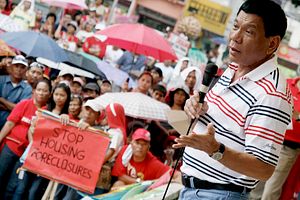Leading Philippine presidential candidate Rodrigo Duterte is often compared to American businessman and politician Donald Trump by political analysts. Both are known for their tasteless humor, politically-incorrect views on gender, and populist posturing. Both are also gaining more followers even if many of their statements are widely criticized for being offensive, racist, and divisive.
But comparing the two is also quite inaccurate. Duterte is not a billionaire; he has been a public official since 1986. And unlike Trump, he boasts of having a good relationship with Muslim and communist rebels. It is unfair to Duterte if he is introduced to the world as a mere copycat of Donald Trump.
Even the tag ‘Dirty Harry’ only reflects Duterte’s tough stance on criminality. As mayor of Davao City, Duterte is also known for endorsing progressive policies that benefited his poor constituents.
True, Duterte has no one to blame but himself if many consider his brutal campaign against crime and drug syndicates as his only concrete legacy. Since the start of the campaign period, he has repeatedly boasted of having already killed hundreds of criminals and that he intends to kill more in order to make the country safe.
So ‘Donald Trump’ and ‘Dirty Harry’ may be misleading descriptions of Duterte’s credentials as a leader, even though they are not entirely wrong and may be useful to understand how Duterte thinks and his methods of governance.
But another way of grasping the Duterte brand of politics is to compare him with two other incumbent Southeast Asian leaders: Thailand’s Prayut Chan-o-cha and Indonesia’s Joko ‘Jokowi’ Widodo.
Prayut is the former army chief who led a coup in 2014 and vowed to pursue reforms through extralegal means. Jokowi is the furniture entrepreneur who became mayor of Solo, governor of Jakarta, and finally the president of Indonesia even without having ties with either the military or the Suharto regime – a major first for the country.
Most of the time, Duterte is like Prayut who insults women and ridicules politicians and mainstream political parties. But there is also a Jokowi side of him: a popular mayor who rose to national prominence even if he is not part of the nation’s ruling elite.
Duterte and Jokowi both attracted national attention in their respective countries for being effective city mayors who combined traditional and unconventional practices in government. Because of their unique leadership style, they were seen by ordinary voters as the alternative candidate who can bring genuine change by ending the callous reign of the old elite and their cronies. Both of them started their campaign with few resources but they were able to mobilize an army of volunteers who helped in sustaining their candidacy.
Meanwhile, Duterte and Prayut are both anti-crime crusaders who believe that strong measures are needed to protect the lives of ordinary citizens. They both support authoritarian policies to promote discipline, nationalism, and peace in society. Both are also unapologetic for making chauvinistic statements in public.
But Duterte is also not like Prayut since the latter assumed power through undemocratic means. If elected president, will Duterte adopt Prayut’s dictatorial policies such as the banning of protests, the excessive regulation of media, and giving broad powers to the army? If his reforms fail to deliver results, will he ‘do a Prayut’ by suspending the constitution and abolishing the congress? The good news is that Duterte is participating in an election in order to assume power; but the bad news is that Duterte is capable of replicating what Prayut is doing in Thailand today once he is in control.
Therefore, the ‘Jokowi’ character of Duterte needs to be made more prominent: a charismatic and unifying leader who represents a new way of doing politics. This includes aspects of Duterte’s record that are less well-known, including his friendly ties with rebels, his openness to progressive ideas, and his willingness to sit down with people’s organizations in drafting programs intended for the marginalized segments of the population.
But Duterte must also learn from the experience of Jokowi, whose reputation as an independent candidate was compromised when he aligned with a traditional party in order to win the election. And while he has not yet finished building his legacy as a leader, Jokowi’s presidency hasn’t impressed many observers thus far when compared to the high expectations that greeted him in 2014.
Duterte will be the first to deny that he shares similarities with leaders of other nations. He will probably assert that he is his own man. And to be sure, the Duterte brand of politics is unique in the Philippines.
But perhaps he would be more critical of his own behavior if he gets to listen and see how Duterte-like leaders such as Trump and Prayut act in public. More importantly, Duterte needs to be reminded that if he becomes president, it is not enough to mouth slogans and make sensational promises (like solving crime and corruption in three to six months) in order to uplift the lives of Filipinos. While his public spectacles may be entertaining, the voting public deserve better and they have to be informed about his concrete agenda and specific plans on how to move the country forward in the next six years.

































